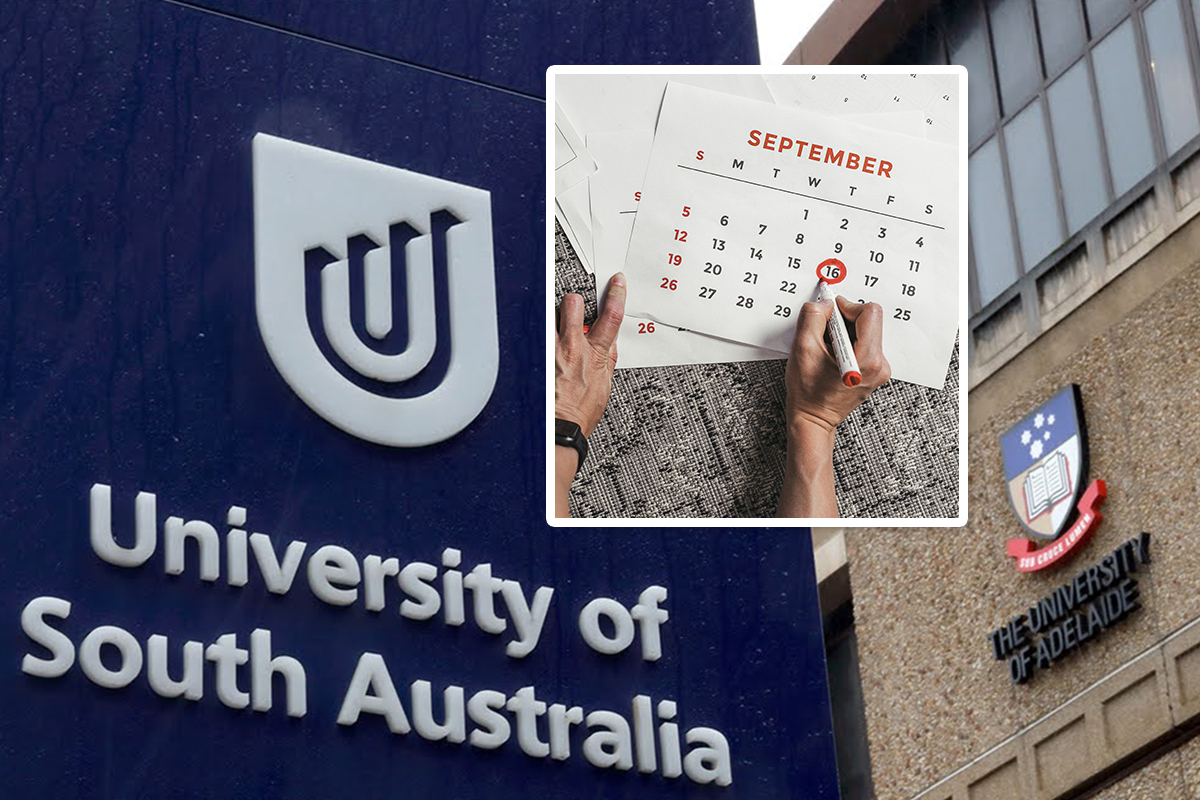The National Tertiary Education Union (NTEU) this week presented polling data to senior management at the University of Adelaide and the University of South Australia about their plan to shift from two semesters to three when the two institutions merge in January 2026.
The 10-week trimester proposal, which was flagged in Adelaide University’s transition plan released in July last year, has emerged as a significant point of contention during the merger process amid staff concerns it may not align with other universities’ academic calendars and will increase workloads.
The NTEU has long been calling for the proposal to be scrapped and said “co-creation” forums held by the new university earlier this year revealed significant staff opposition.
The union last month conducted a five-day “snap poll” of 1109 staff – 46.5 per cent from the University of Adelaide and 53.4 per cent from UniSA – on the trimester proposal.
On the question of “Do you support Adelaide University moving to a trimester teaching model?”, 82.9 per cent answered No compared to 17.09 per cent Yes (907 vs 187 staff).
An even higher 84.97 per cent responded No to if they thought trimesters “will improve learning outcomes for students”, while 81.9 per cent believed their workloads would increase as a result.
Although those opposed to trimesters may have been more likely to respond, the union stressed that 57 per cent of respondents were not union members.
NTEU SA division secretary Dr Andrew Miller said the poll was sent to all union members at the two merger universities and then “all staff at UniSA and Uni of Adelaide based on publicly available data”.
In a members bulletin last week, the union said the new university was pressing ahead with trimesters despite “overwhelming opposition from staff”.
“Respondents believe it will massively increase their workloads, and as soon as you increase teaching workloads, by default, you tend to compromise research workloads,” Miller told InDaily.
“If you’re having 10-week trimesters and filling up more of the calendar year with teaching weeks, you’re delimiting the kind of in-between times for processing, for research, for student engagement, student consultation and so forth.
“So you’re really crowding the academic calendar, and… there is misalignment with holidays and particularly for international employees who periodically want to take holidays and return to their countries of origin and so forth.”
Miller claimed the trimester plan represented “decision-making by stealth” whereby staff, students and stakeholders “only get to provide feedback on the predetermined outcomes”.
InDaily contacted Adelaide University with questions about the new polling. In a statement, an Adelaide University spokesperson said: “It is appreciated that some staff will have concerns about the introduction of trimesters.”
“We want to explore the transition to a trimester calendar together and we will consult with staff so the implications for our services, operations, students and staff can be understood and worked though in detail.
“Staff engagement on the new University is occurring in a structured way and consultation on the phased transition to a trimester calendar will take place later this year.”
The spokesperson also said the ambition of the new Adelaide University is to deliver “Australia’s most accessible, contemporary curriculum that creates more flexibility for students than ever before”.
They also noted that the university’s transition plan released in July 2023 referenced the trimester model “as the overarching preferred model for delivery of content, which would benefit students by enhancing opportunities provided by the new curriculum”.
According to an emailed announcement sent to UniSA staff on May 20, the new university will later this year be “exploring the gradual transition to a trimester calendar across the period 2026 to 2028 to support student experience of our new curriculum”.
“As course development commences, we will design for a modular academic calendar that can be semesterised or trimesterised in line with the transition plan through this period,” curriculum domain leaders Professor Joanne Cys and Professor Katrina Falkner said at the time.
Adelaide University is launching its new brand on July 15.
The new institution has already passed a number of key milestones, including recognition by the national higher education regulator as an Australian higher education provider.

